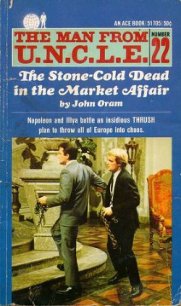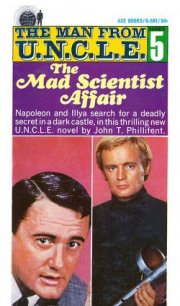The Copenhagen Affair - Oram John (читать книги онлайн бесплатно полностью без txt) 📗
He put out his hand, smiling for the first time. “And by the way, don’t worry about losing your job. Your firm has just acquired a contract worth a quarter of a million pounds. That will account for your lost time. The appropriate papers are in your briefcase. You can read them on your journey. I can—er—assure you they are quite genuine.”
“But—” Mike began.
Waverly shook his head. “I know, I know. You are going to tell me you have an account to settle with a man called Garbridge. Believe me, that is quite impossible…and unnecessary.” His tone was final.
Karen stubbed her cigar in a blue glass ashtray, and rose to her feet. “Come on, Mike. I’ll see you out of the building.”
When they had gone Solo said, “And what, to quote our late guest, was that all about?”
Waverly walked over to a console near the big picture window. He pressed two buttons on the panel and a motion picture projector and a beaded white screen slid quietly into view. The projector measured not more than five by three by one inches. It could have been a child s toy. The spools on the arms were no larger than a silver dollar.
He broke open one of the containers, removed a roll of sub-miniature film, threaded it on to the spools and into the projector. “Watch!”
The room went dark. The projector motor whirred. Something that looked like a dustbin lid shot rapidly across the bright oblong of the screen. There was what appeared to be an explosion or a direct hit from a shell. Then the screen was blank again.
The room lights went on again. Waverly opened a second container, threaded a second length of film.
This time it showed a stretch of deserted, wooded countryside that might have been in the English Lake District. Again a dustbin-lid object came into sight. It hovered briefly above a group of birches, then dropped vertically and disappeared. This time there was no explosion.
The third film, taken in slow motion with a telephoto lens, was practically a repetition of the second. But in close-up it could be seen that the “handle” of the lid-like object was a turret or cockpit. What looked like portholes were clearly visible around the “rim”.
Solo said unbelievingly, “UFOs! Flying saucers!”
“Exactly.” Waverly was pleased. “And where, do you suppose?”
Illya said, “Since the film came from Denmark, I should think Jutland. The scenery looked typical.”
“Exactly,” Waverly said again. “No doubt the remainder of the films will give us further data.”
He led the way back to the table, pressed the button on the intercom and said, “Bring me File AID/976.”
A pretty Negress hurried in with a bulky dossier, flashed a smile at the two agents, and departed. Waverly adopted his favorite lecturer stance, took a briar pipe from his pocket and began to twist the bowl between knobby fingers.
He said, “There is nothing new in the flying saucer legend. Twelfth-century monks left a record of some great ‘fiery ship’ which appeared in the skies of France and terrified the peasantry. There have been many such stories through the ages. Wars always result in a bumper crop. For instance—”
He turned the pages of the file.
“—here’s a clipping from a Welsh newspaper just after the Boer War. It speaks of ‘balls of fire’ that appeared in many places in South Wales and, apparently, dropped in persistently at the meetings of the noted evangelist Mrs. Mary Jones. One is even said to have followed her car for miles along winding roads.
“Here’s another cutting. It seems that walking along a road near Caerphilly on the night of May 18, 1909, a Mr. Lithbridge, of Roland Street, Cardiff, saw on the grass a huge tube-shaped craft carrying two men in fur overcoats. When he came in sight they jabbered together in some unknown tongue, and the machine took off swiftly into the blue.”
Solo nodded.
“There were many similar yarns after World War II,” he said. “Wasn’t a flock of flying saucers supposed to have massed over the Pentagon one night?”
Illya said, “I remember that. A couple of pursuit planes went up after them. They crashed and both pilots were killed.”
Waverly polished his briar thoughtfully. “Most of the tales can be dismissed as sheer fantasy—the aftermath of a turkey dinner or a drink too many,” he said. “But some of the sightings simply can’t be explained away so easily.
“Quite recently a party of Danish scientists were returning by air from viewing an eclipse of the sun in Africa. Suddenly—in broad daylight—some huge flying object appeared out of nowhere and kept pace with their aircraft for miles. They had time to film it with a 16mm camera and to take a series of still photographs before it disappeared as mysteriously as it had come. They saw something outside of normal experience. Their statements are here.” He tapped the file on the table. “But what did they see, and where did it come from?”
He went to a locker and produced a misshapen lump of something that might have been dirty glass.
“What, gentlemen, do you make of that?”
The two agents examined it. It was quite smooth, dark—almost black—and weighed around ten pounds.
Solo said, “Whatever it is, it’s been under intense heat. Some kind of volcanic rock, maybe.”
Waverly said, “A Copenhagen newspaperman, not given to sensationalism, got a tip that strange things were happening on Jutland. He went to the island to investigate and heard stories of weird, silent machines which flew at incredible speed and could rise and drop vertically. A farmer took him to the place where he swore he had seen one of the monsters actually taking off. The reporter saw a great circular patch of scorched ground where the very boulders had fused like lava. He brought this piece away as evidence.
“We put our people in Copenhagen onto the matter. Now—well, you have seen the films…”
“And Norah Bland died getting them to us,” Illya said. “There’s not much fantasy about that.”
There was a short silence. Then Solo said, “This man Garbridge—who is he?”
Waverly picked up the file and thumbed through it. “You’ll find him in here. He is an Irishman, the black sheep of a fine old army family. A professional soldier, cashiered following an unpleasant business involving the daughter of one of his sergeants. The girl died. That happened in 1938. When he was thrown out of the army he went to live in Denmark and he has been there ever since.
“During the occupation his Irish passport saved him from internment. The Danes suspected him of collaboration with the Germans, but they could never prove it. Oddly, the Germans suspected him of working with the Resistance. They couldn’t prove it either. But they were both right. He was a ruthless and diabolically clever double agent, owing allegiance to only one power.”
Illya said softly, “Thrush!”
Spin a globe of the world. Examine every inch of it. You will never find the name of Thrush engraved there. Yet time and again, as you pass your hand over country after country, you will be touching unwittingly on territories dominated by that sinister nation. Those territories are designated by Thrush as Satraps.
Thrush has no geographical boundaries as we understand them. There are self-contained units in various sections of many countries—and these units, these Satraps, owe their allegiance to Thrush alone.
A Satrap may take the form of a manufacturing complex, or a school, or a hospital, or a maze of underground tunnels and caverns, or a department store in the heart of a big city. The Satraps exist as functional parts of the society in which they have been set down. But they have a shadow existence all their own, a secret life in which they dedicate their fanatic loyalty to Thrush.
For Thrush, like other nations, has a national purpose. Thrush’s purpose is to dominate the earth.
Thrush has its own structure of authority. At the top is the Council—a group of men and women, all leaders in their various fields and almost universally super-intellects and scientists. They all hold positions of importance in their own countries. But no matter where they live, no matter what their race, creed or color, they pledge their loyalty to Thrush.



![[Magazine 1966-12] - The Goliath Affair - Jakes John (чтение книг TXT) 📗](/uploads/posts/books/56867/56867.jpg)
